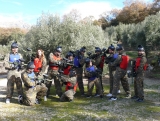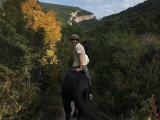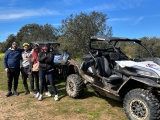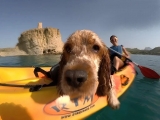
Who is adaptive diving for?
It's important to clarify that we're referring to mobility impairments, not visual or cognitive disabilities. This includes people with disabilities affecting movement: those who can't walk, have limb differences, or have restricted mobility compared to able-bodied individuals.
In the aquatic environment, we could say we're all disabled to some extent, as it's not our natural habitat. The sea presents barriers that challenge both able-bodied and disabled divers alike.
Can all physically disabled individuals dive?
Virtually all individuals with disabilities that allow them to maintain social lives - even if they require assistance for daily activities - can dive.
- Can dive: individuals with lower or upper limb amputations, paraplegics, polio survivors, spina bifida, brachial plexus palsy, quadriplegics up to C6 level, traumatic brain injury resulting in tetraparesis, etc.
- Cannot dive: individuals who've lost the ability to grasp (gross motor function) with both hands, those without swallowing/breathing control, or those who've lost cognitive and learning abilities.
And of course, in most cases, where there's a will there's a way. If you're not genuinely interested in exploring underwater beauty, we'd advise against it. Often, limitations in the aquatic world exist primarily in our minds.

What does a disabled diving course involve?
To scuba dive, regardless of disability status, you'll need to complete training. However, you can always try a discovery dive first to confirm this water sport ignites your passion.
Currently, several diving schools offer adaptive diving courses, divided into two parts. The theoretical component includes 6 classroom sessions (5 standard technique classes plus 1 adaptive diving class), while the practical component involves 10 training dives split between pool and open water sessions.
These practical sessions cover standard diving exercises while addressing equipment adaptation solutions and challenges related to different water entry methods: beach, pier, or boat access.
Upon completing an adaptive diving course, disabled divers earn a one-star certification (FEDAS-CMAS) and C1-C2 classification (FEDMF). This qualification allows diving anywhere, provided the certification requirements are met.

Classification system for physically disabled divers
- C1 Diver: requires full assistance for water entry/exit and partial/full assistance with pre-dive procedures. Underwater, they need partial/full assistance for most technical diving maneuvers and movement.
Example conditions qualifying as C1: quadriplegia, tetraparesis from head trauma or other conditions causing severe motor control deficits.
- C2 Diver: requires assistance with water entry/exit and/or partial help with some pre-dive procedures. Underwater, they must be fully independent with all technical diving maneuvers and mobility.
Example conditions qualifying as C2: paraplegia, limb differences, polio survivors. Essentially, individuals without upper limb impairments.

Now you know diving has no limits... What are you waiting for to transform your life with a proper scuba diving experience?












